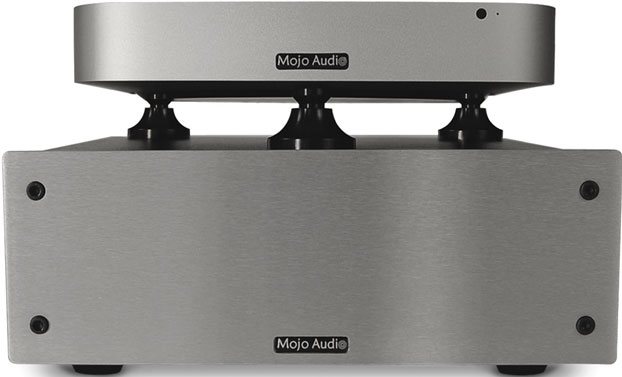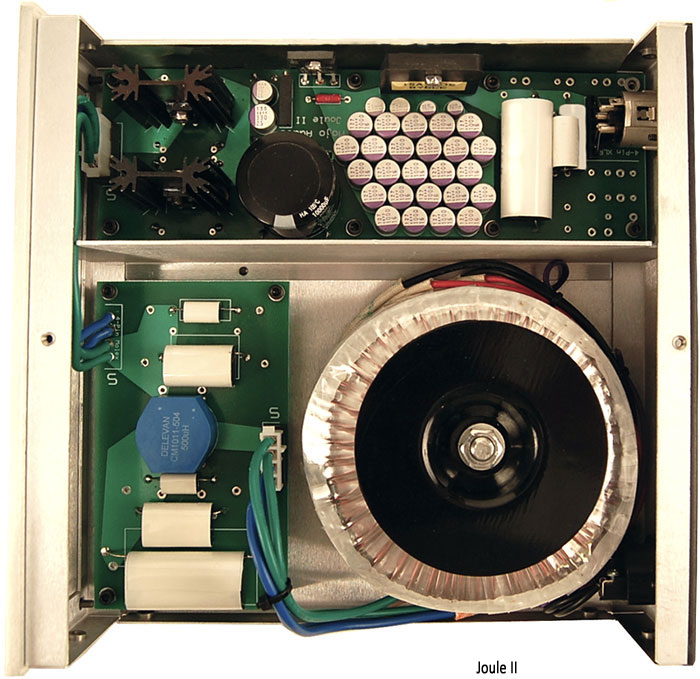LB: Let’s switch gears now to your digital products. Computer audio has quickly transitioned from a niche market to gaining wide-spread acceptance in the audio market, both for the AV enthusiast and for professional audio. What was your introduction to computer audio?
BZ: I actually was introduced to using a Mac Mini for high-end computer audio by one of my DAC customers. Up until that time, I’d heard laptop computers used as media servers and was not very impressed. Granted, I was comparing a stock laptop computer to my highly modified CEC transport, which is certainly one of the finest “optical spinners” in the world.
After I built the first prototype Mac Mini power supply, my mind was completely blown: It had so many fewer bit read errors the result was roughly double the resolution of any “optical spinner” I’d ever heard. In addition to having significantly higher resolution, the modified Mac Mini had better time, tune, and musical flow. Needless to say, a week later my beloved CEC transport was sold on eBay, and Mojo Audio started manufacturing computer-based media servers.
LB: Tell us about your Media Server. As it is based on a Mac Mini, the first question is, why did you choose Mac as a platform? What factors made you choose the Mac Mini as a platform; did you experiment with more powerful Macs such as a Mac Book or iMac?
BZ: Apple uses very high-quality parts and unparalleled engineering, which make even a stock Mac Mini perform better than just about any transport I’ve heard costing less than $1,000. Another big advantage is that Apple computers are capable of running any operating system. In addition to OS X, they can run Windows or Linux, which makes Apple computers compatible with any software and media formats. Since OS X is based on Linux it is far more stable and efficient than the same hardware running Windows. This is why anyone who has owned both Windows and Apple computers knows the speed specifications on the CPU and other components are not comparable. The Mac Mini also runs off one voltage, so it can easily be converted for external power supplies.
Apple laptops and iMacs do not perform as well the Mac Mini as media servers because the formers’ integrated monitors generate noise. Because they are “headless,” the Mini and Mac Pro tower have been among the top choices for both AV enthusiasts and professionals for many years.
LB: There are different views in the industry about what type of computer makes the best server. Some feel that computing power is essential, while others (including you, it seems) feel that lower noise is a critical element.
BZ: Have you heard the expression “don’t use a cannon to kill a mosquito”? This notion of overkill also applies to computer-based AV systems. Unless you are doing advanced digital signal processing (DSP) in audio recording or 3D graphics rendering, the entry-level Mac Mini with a dual-core i5 processor is more than powerful enough. For DSP room correction, digital EQ, digital crossovers, gaming, or high-def video playback, we recommend one of the higher-end Mac Minis with a quad-core i7 processor. In all cases we recommend a minimum of 8GB of RAM in media severs for smoother data transfer.
Certainly if you are a professional doing multitrack audio recording with DSP or 3D video graphics rendering, a higher-performance CPU, video processor, sound card, and more RAM would be an advantage. The problem is that these higher-performance computers come with excessive power supply and fan noise, making them less desirable for simple AV playback.
That being said, Mojo Audio will soon be releasing our Joule ATX modular power supply system, which can be used with Mac Pro towers or any other ATX-compatible computer system. By going with standard ATX boards, we provide limitless options that can take performance to a new level for both enthusiasts and professionals.
LB: The most obvious difference between your Media Server and a stock Mac Mini is your use of an external supply. Why did you choose to go this route, and how does it impact the performance of the Mac Mini?
BZ: Replacing the stock switching power supply with any low-noise linear or battery power supply literally removes so many bit read errors that it roughly doubles the Mac Mini’s resolution. The result is higher resolution along with better time, tune, tone, timbre, and a more analog-like musical flow.
Because Mojo Audio’s Joule II Power Supply has lower noise than any battery, our media servers have roughly triple the resolution of a stock Mac Mini. The most noticeable improvement from lower power supply noise is in the liquidity and analog-like quality of the sound.
LB: How does your Media Server differ from a music server? Are there different types of each? How do they differ in performance?
BZ: Music servers play audio alone; media servers play both audio and video.
I’ve not heard of any standards for AV server types, but we could divide them into categories based on how they work, where they can import media from, and the different types of software they can use. Since our Mac Mini media server can import files from any source, can use any operating system and player software, and can read any file format, we call it a “universal” media server.
We’ve found the power supply affects performance more than anything else. We sell a lot of our Joule II Power Supplies as an upgrade for the cheap wall wart power supplies that come with many proprietary streaming devices and media servers.
Player software significantly affects performance. The problem with proprietary media servers that you can’t get around, is that they lock you into using only their player software which is most often inferior to the better player softwares on the market.
- ← Previous page
- (Page 3 of 6)
- Next page →



There is some misleading information. OS X is NOT based on Linux, it’s based on Unix. There is a difference, albeit not that much, but OS X is NOT based on Linux. Ben might want to change his response to the question.